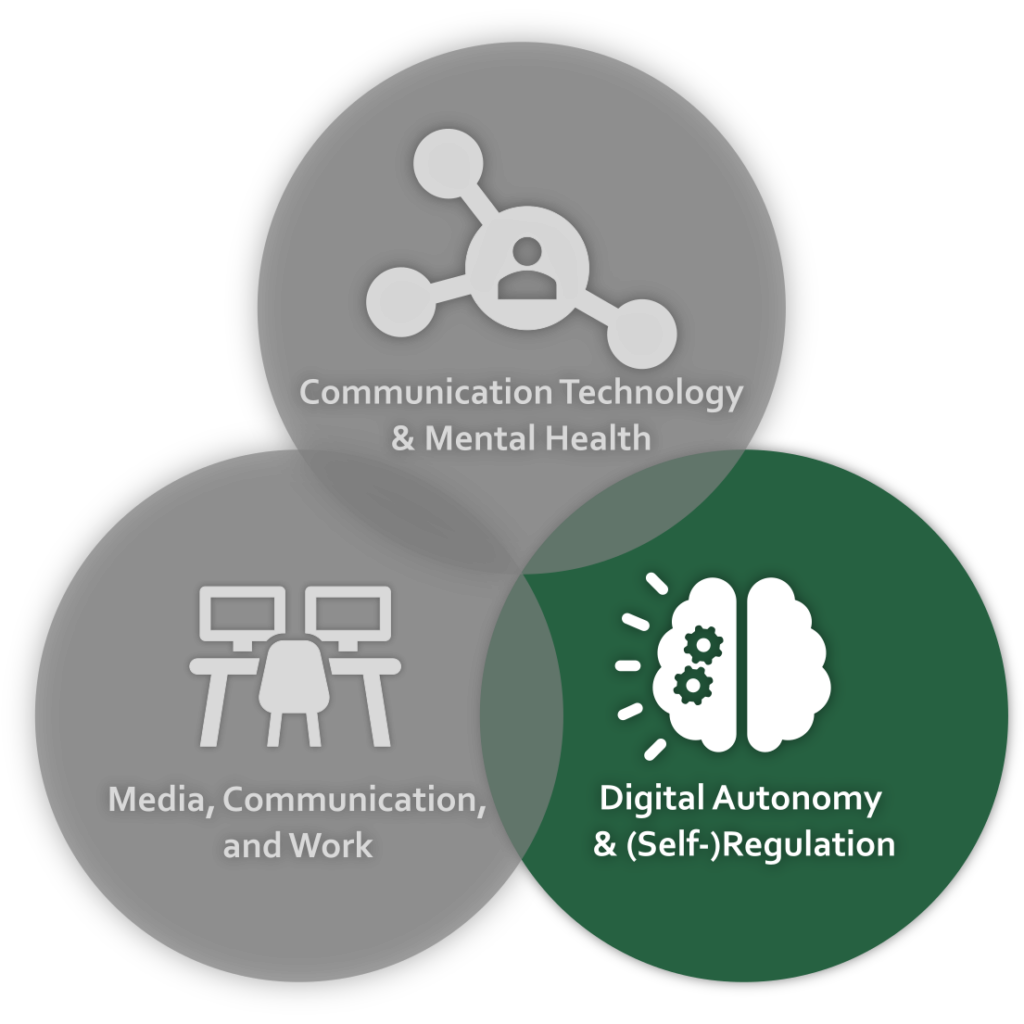The research focus Digital Autonomy & (Self-)Regulation revolves around the question of what a self-determined and effectively (self-)regulated use of media and digital technology can look like in a permanently connected world. The research focus is motivated by the observation that media use accounts for a large share of most people’s waking time budget (approx. 7-8 hours per day) and that using digital media such as smartphones and social media has permeated almost all life domains. In the course of this “mediatization of everyday life”, the question often arises as to how the use of digital media and communication can be successfully (self-)regulated, especially where there is tension with other life domains (e.g. work, recreation, interpersonal interaction). Even though there are many strong opinions on this question, it has so far been difficult to provide a reliable, evidence-based answer. Using diary studies, experience sampling, digital behavioral data and experiments, we therefore investigate the selection, processing and impact of ubiquitous digital media offerings through the lens of (media) psychological self-regulation theories and in the context of digital media policy.

The following research strands and projects characterize this research area:
In a first line of research, we focus on the interplay of usage habits and users’ self-control skills. Media use is often highly habitualized and follows everyday routines. For example, we investigate the influence of different usage habits (e.g. automatic smartphone checking) in interaction with self-control motivation and capacity on a variety of outcomes (e.g. performance, procrastination, well-being).
In a second line of research, we investigate the self-regulation of media use through the lens of moral, self-conscious emotions (e.g., guilt, shame, pride, regret) and under the influence of (non-)usage and accessibility norms. For example, together with colleagues from the Universities of Mannheim and Mainz, we have investigated this interplay in the context of mobile messenger use in a series of vignette and laboratory experiments. In collaborations, we are currently investigating the Appraisal of Media Use, Self-Control and Entertainment (AMUSE) model developed by Prof. Meier and Prof. Leonard Reinecke (JGU Mainz), using digital behavioral data from streaming platforms (e.g. Netflix).
The third line of research focuses on the positive aspects of self-regulatory media use: we investigate the role of digital media and communication for psychological need satisfaction, a central branch of self-determination theory. The basic human needs for autonomy, competence and connectedness can be satisfied in many ways – usually at low cost – through media use and digital communication, but are also often frustrated by media or media do not prove to be as effective as hoped. We investigate, for instance, the role of autonomy in digital interpersonal communication for psychological need satisfaction vs. frustration. In a theoretical model developed in collaboration with colleagues from the Universities of Mainz and Mannheim, the Integrative Model of Mobile Media Use and Need Experiences (IM3UNE), our research identifies and tests central processes and boundary conditions of need satisfaction and frustration, especially through mobile media.
Selected publications in this research area:
- Meier, A. (2022). Studying problems, not problematic usage: Do mobile checking habits increase procrastination and decrease well-being? Mobile Media and Communication, 10(2), 272-293. https://doi.org/10.1177/20501579211029326
- Halfmann, A., Meier, A., & Reinecke, L. (2021). Too much or too little messaging? Situational determinants of guilt about mobile messaging. Journal of Computer-Mediated Communication, 26(2), 72-90. https://doi.org/10.1093/jcmc/zmaa018
- Reinecke, L., & Meier, A. (2021). Media entertainment as guilty pleasure? The appraisal of media use, self-control, and entertainment (AMUSE) model. In P. Vorderer & C. Klimmt (Eds.), The Oxford Handbook of Entertainment Theory. (pp. 203-230). Oxford University Press.
All publications of the Chair can be found here.
